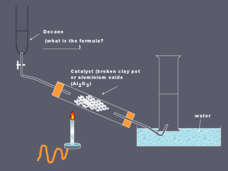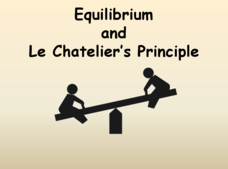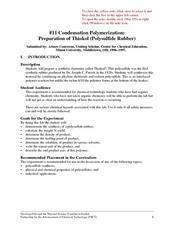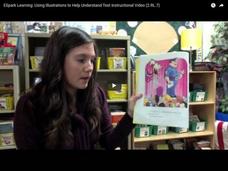Curated OER
Chemistry Crossword
In this chemical reactions worksheet, students complete a crossword puzzle by figuring out the vocabulary words associated with 34 clues.
Curated OER
Addition Reactions
Here is a PowerPoint that displays multiple organic compound structures and asks viewers to identify the formulas, isomers, or potential products after a given addition reaction. This is a comprehensive set of slides that reviews...
Cornell University
Radical Reactions
The radical reactions of polymers seems abstract to many pupils, but this lesson turns them into a fun building game. Scholars use dice and building pieces to build polymers. Then, they determine the theoretical and experimental weight...
Net Texts
Hess's Law Worksheet
Challenge young scholars' understanding of thermochemistry with this skills-practice learning exercise on Hess's Law. Given a series of five multi-step chemical reactions, students must determine the overall change in entropy for each.
Curated OER
Organic Chemistry-Understanding Organic Reactions
For this organic reactions worksheet, high schoolers are given descriptions of the seven types of reaction of organic compounds. They then answer six questions about these reactions.
Curated OER
Metals and Hydrogen Cars: Chemistry 10-12
Students investigate which metal is best to use as storage material in hydrogen cars. In this chemistry lesson, students differentiate endothermic and exothermic reactions. They write a reflection paragraph about what they learned in the...
Curated OER
Reactions of Benzene
For this chemistry worksheet, students write the products for each of the given reactions. Then they write N.R. if there is no reaction present. There are eight reactions to identify on the sheet.
Curated OER
Chemistry 115 Practice Exam 3
Radioactive decay, pH, properties of elements, organic compounds, and stoichiometry are all touched upon through this practice chemistry exam. It always helps learners to take a practice test in preparation for the actual exam. This...
Curated OER
Organic Chemistry
In this organic chemistry worksheet, students name the molecules shown and circle and name the functional group of the given molecules. Students draw the skeletal structure for chemical compounds. This worksheet has 5 problems to solve.
Science Geek
Equilibrium and Le Chatelier's Principle
Time to shake up the status quo with a presentation that describes Le Chatlier's Principle and has pupils examine situations in which equilibrium is upset. Four examples show different stresses to the reaction and the resulting shift.
Curated OER
Chemistry quiz
In this chemistry instructional activity, students answer short answer and true and false questions about acids, bases, atoms, elements, and more. Students complete 20 questions.
Curated OER
Condensation Polymerization: Preparation of Thiokoll® (Polysulfide Rubber)
This lab activity is geared toward experienced chemistry learners, in particular, those who are familiar with organic chemistry. They will create a synthetic elastomer and then make observations and measurements of its different...
Museum of Science
goREACT
Beginning Boyles and curious Curies can safely experiment with the virtual mixing of elements using this entertaining application.
Curated OER
Chemical Reactions
In this chemical reactions worksheet, students calculate the molar mass and the rate of reaction for the given chemical reactions. This worksheet has 3 problems to solve.
Curated OER
The Synthesis of Some Organic Compounds And Their Representative Structures
Students examine how to represent organic compounds three-dimensionally. They write a synthesis reaction for three demonstrations, and construct a three-dimensional structure using a molecular modeling set.
Royal Society of Chemistry
A Giant Silver Mirror Experiment
Mirror, mirror, on the wall ... who's the best chemistry teacher of them all? You'll get the vote for certain after your class completes the Silver Mirror experiment! Partnered pupils use Tollen's reagent and glucose to silverplate a...
National Institute of Open Schooling
Alcohols, Phenols and Ethers
Classes continue their study of organic compounds in a detailed lesson covering alcohols, phenols, and ethers. Naming these compounds, classifying them, and describing their preparation and use are some of the topics covered. Through...
Curated OER
Azo Compounds
This short slide show introduces organic chemistry apprentices to the azo compounds. The general structure is displayed, diazonium salt synthesis is described, and various coupling reactions are explored. Use these slides to support a...
Curated OER
Classes of Reactions
Show your chemistry class a graphic organizer classifying the types of chemical reactions. A few additional slides are included on the formation of magnesium chloride, the production of methanol, and a diagram of a mixture of molecules....
Curated OER
Math, Chemistry, and Food
Young scholars explore the effects of chemical reactions when cooking. Using the Internet, they research enzymes and then mix jello. They examine their results and test enzyme activity by adding pineapple to the jello. Finally, they...
Earth Day Network
Staying Green While Being Clean
Clean up the environment with a lesson plan that focuses on replacing hazardous cleaning supplies with green, environmentally-friendly products. Using a dirty patch of surface as a control area, kids clean other parts of various surfaces...
Curated OER
Addition Polymerization: Preparation of Polystyrene Using Two Types of Initiators
Advanced chemistry classes compare the polymerization of styrene using two different initators: benzoyl peroxide and aluminum chloride. Once they synthesize polystyrene, they compare the two producet for melting point and density. There...
Virginia Department of Education
States of Matter
Scientists have been studying exothermic reactions before they were cool. The lesson begins with a discussion and a demonstration of heat curves. Scholars then determine the heat of fusion of ice and the heat needed to boil water through...
National Institute of Open Schooling
Nomenclature and General Principles
Carbon, the base for all organic compounds, exists in nature in its purest form as graphite or diamonds. The 25th lesson in a series of 36 teaches pupils the nomenclature of organic compounds. Learners read about how to use the IUPAC...

























